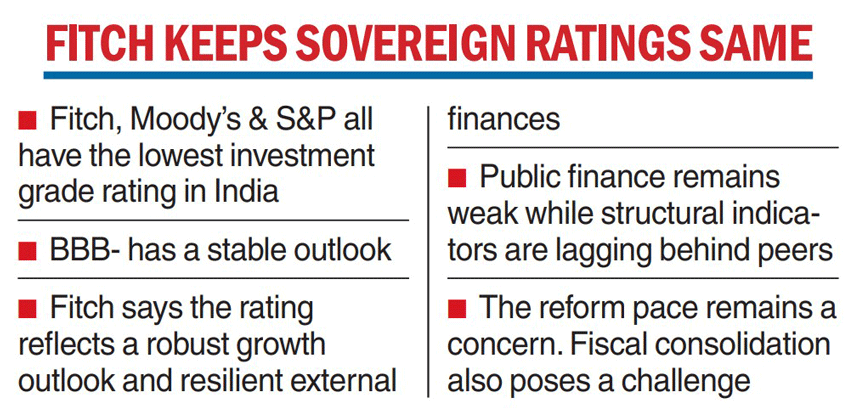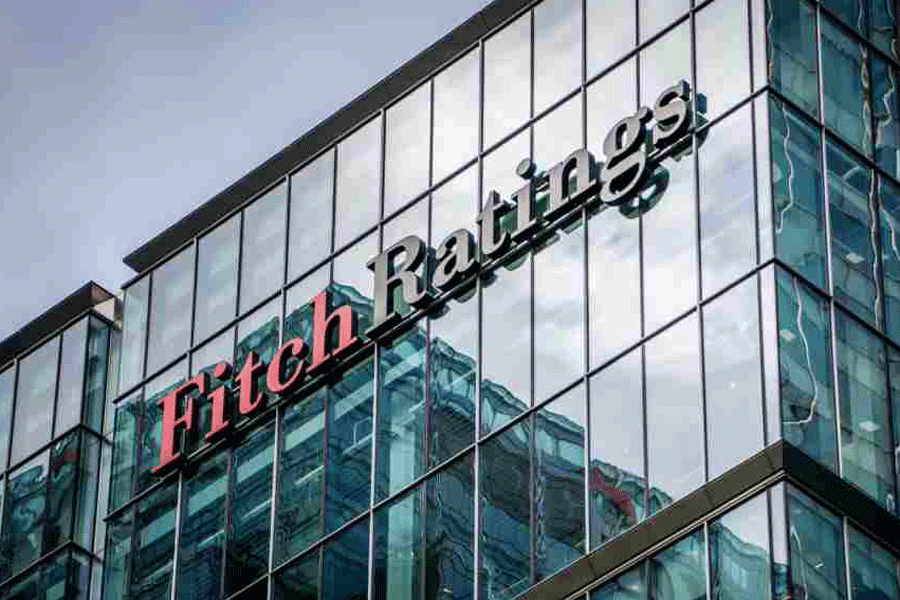Rating agency Fitch on Tuesday affirmed India's sovereign rating at ''BBB-'' with a stable outlook on robust growth and resilient external finances but said weak public finances remain a challenge.
India's rating has been unchanged at ''BBB-'', the lowest investment grade, since August 2006
"Fitch Ratings has affirmed India's Long-Term Foreign-Currency Issuer Default Rating (IDR) at 'BBB-' with a Stable Outlook," it said in a statement, adding strong growth potential is a key supporting factor for the sovereign rating.
But the agency has flagged off multiple areas of concern such as reform implementation and subdued global demand and warned that a reduction in deficit would impact government expenditure.
The agency estimates growth in the 2022-23 fiscal at 7 per cent and 6.7 per cent in 2024-25.
"India's rating reflects strengths from a robust growth outlook compared with peers and resilient external finances, which have supported India in navigating the large external shocks over the past year. These are offset by India's weak public finances, illustrated by high deficits and debt relative to peers, as well as lagging structural indicators, including World Bank governance indicators and GDP per capita," Fitch said.
While the IMF estimates India to grow at 5.9 per cent in 2023-24, the World Bank has projected 6.3 per cent growth and the RBI, 6.5 per cent.
All three global rating agencies — Fitch, S&P and Moody's — have the lowest investment grade rating in India, with a stable outlook. The ratings are considered by investors as a barometer of the country's creditworthiness and impact borrowing cost.
Fitch said India will face headwinds from elevated inflation, high-interest rates and subdued global demand, along with fading pandemic-induced pent-up demand.
It said growth prospects have brightened as the private sector appears poised for stronger investment growth following the improvement of corporate and bank balance sheets in the past few years, supported by the government's infrastructure drive.
Still, risks remain given low labour force participation rates and an uneven reform implementation record.
"India's large domestic market makes it an attractive destination for foreign firms. However, it is unclear whether India will be able to realise sufficient reforms to allow the economy to benefit substantially from opportunities offered by the deeper integration in global manufacturing supply chains, including China+1 corporate strategies that encourage diversification in investment destinations," Fitch said.
Fitch estimates inflation to remain near RBI's 6 per cent threshold, averaging 5.8 per cent this fiscal against 6.7 per cent last year.
It said the fiscal consolidation path, under which the fiscal deficit is to be brought down to 4.5 per cent of GDP by 2025-26, remains challenging.
The government has demonstrated a recent commitment to meeting its budget targets. "However, we believe it will be a challenge to achieve this target, which would require accelerated consolidation of 0.7 percentage point (pp) per year in FY25 and FY26 compared with 0.3 pp in FY23 and 0.5 pp in FY24."
"Future deficit reduction is likely to come mainly from trimming expenditure."












